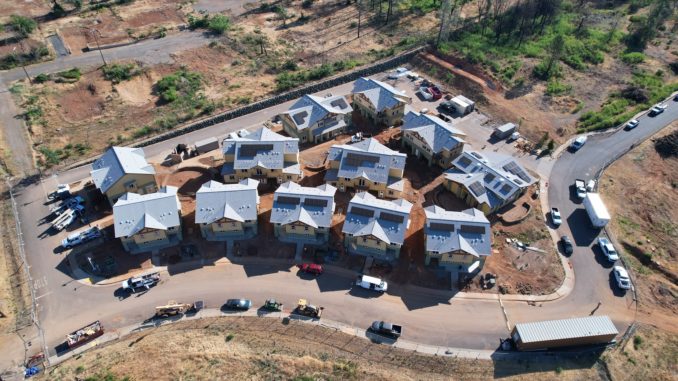
When Jennifer Wolfe drove to her new neighborhood in lower Paradise, she didn’t focus on the charred trees or the canyon left bare in the wake of the Camp Fire.
As the sun set, she envisioned her 10-year-old son, Riley, and a friend riding their bikes down the street on warm summer nights. She could see him swaying in a hammock in the backyard; she and him catching frogs; hosting family dinners.
When she visited the neighborhood, she didn’t see the destruction. All she saw was home—at last.
This neighborhood off Pearson Road is where she and her son will finally settle down after years of moving around after the disaster, which wiped out thousands of homes and claimed 85 lives.
Wolfe and her son aren’t the only ones whose dreams of returning home to the Ridge have now become a reality. Three families have started building their homes on the same street, all selected as part of Habitat for Humanity of Butte County’s affordable housing program.
The fire inspired the nonprofit to ramp up its efforts, dedicating more time and resources to the rebuild. While Habitat for Humanity typically builds about two homes per year in Butte County, it now will focus solely on Paradise, with the goal of building 10 homes per year there, giving first preference to fire survivors.
Another nonprofit, Community Housing Improvement Program (CHIP), is also expanding its plans in Paradise. CHIP aims to finish rebuilding Paradise Community Village, a 36-unit complex that was destroyed by the fire, this September. In addition, it is launching home-ownership programs for rebuilds in Paradise—eight homes will be constructed initially.
Both organizations are aiming to serve local, working, low-income families—many of which were uninsured renters at the time of the fire. These are families that have struggled to get back on their feet in the wake of a disaster that struck an impoverished county already in the throes of the statewide housing crisis. That crisis, plus delays due to the COVID-19 pandemic and an overwhelming unmet need, make their work a daunting task.
Wolfe, a single mother who was born in Paradise and has lived there most of her life, told the CN&R that home ownership was a dream of hers that was simply unobtainable due to her single income and lack of credit. In the aftermath of the fire, she ended up on wait list after wait list for rentals, finally landing an apartment in Chico that was smaller than her old place in Magalia, didn’t have a yard and cost nearly twice as much to rent.
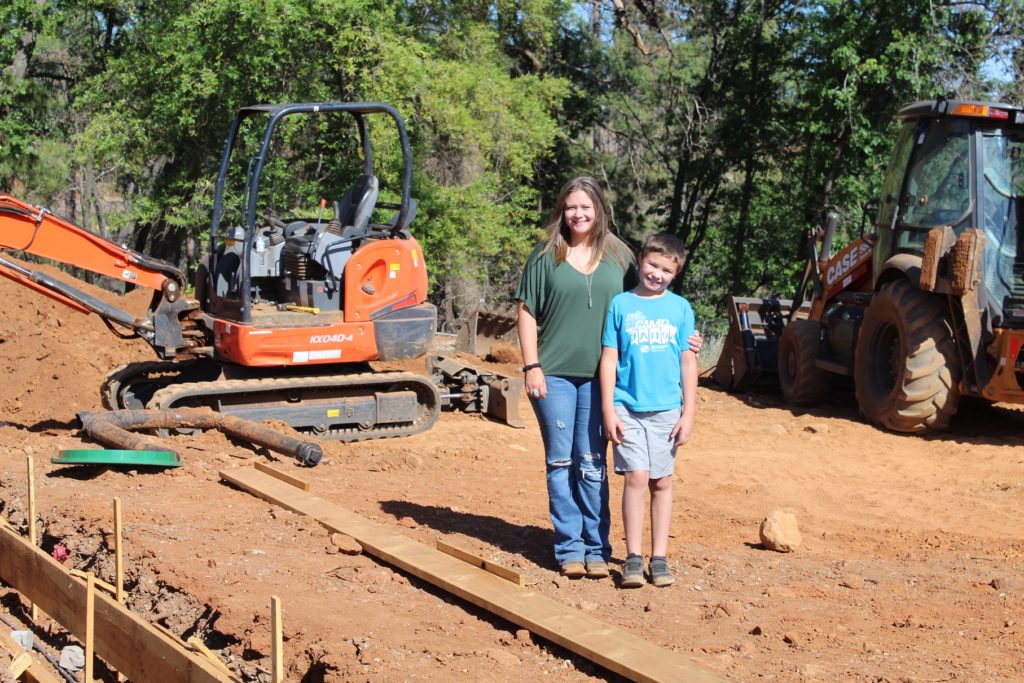
Even then, she was only able to move in with rental assistance from the Community Action Agency of Butte County. She lost her job as a waitress at Jaki’s Hilltop Cafe after it closed due to the Camp Fire; then COVID-19 caused her to lose her job at Casa de Paradiso, which closed its doors due to the impacts of the pandemic.
She’s since been able to obtain a full-time job at a local nonprofit, but those months while she was searching for work and for a place were rough. Her son kept her motivated, she said: “I wanted to provide safety, security and stability for him.”
Even though she’s been out to the site of their future house many times, the reality that they’ll be back home on the Ridge still hasn’t hit her yet. It’s a subject that brings happy tears to her eyes.
“We’ve been through so much. … It still doesn’t feel real,” Wolfe said. “This is the first time I can dream and plan.”
‘More relevant than ever’
Habitat for Humanity’s team is personally motivated to make a difference in Paradise, Executive Director Nicole Bateman told the CN&R—several staff and board members were among the survivors of the deadly blaze.
After the fire, the local nonprofit received support from the international Habitat for Humanity organization and enough donations and funding to get started on its first homes for survivors coming back to the Ridge—on that quaint street that the Wolfes will soon call home. Habitat for Humanity of Butte County expanded its capacity, bringing on board a development manager, homeowner coordinator and administrative assistant. The affiliate also created two full-time positions in construction (versus one part-time) and shifted its accountant position to full-time as well.
Bateman is confident this internal expansion will help the organization be better equipped to respond to local housing needs.
“We are here for a reason,” Bateman said. “And we’re going to do our part to help the community heal and to rebuild and for those families to find some peace.”
In the 28 years since Habitat for Humanity was established locally in Chico, it has built 40 homes and had no foreclosures, Bateman said. It had one home in Paradise before the fire that was destroyed. (The property owner has since moved out of the area and donated her land to the effort.)
“Affordable housing, that’s the No. 1 need in our community,” Bateman said. “The need was already there before the fire. Our mission is more relevant than ever.”
Habitat for Humanity’s programs aren’t a panacea, and not everybody will qualify. The organization specifically serves households that have some form of stable income—whether that comes from disability benefits or employment, for example—and a low amount of debt. Their income must be between 40 percent and 80 percent of the median income for Butte County (i.e., $22,700-$45,250 for a household of two, $26,785-$50,900 for a household of three and $30,775-$56,550 for a household of four). The families also have to dedicate 250 volunteer hours or “sweat equity” into the home, be it through the literal erection of walls or working at Habitat for Humanity’s ReStore housewares shop on Meyers Street in Chico.
But for those who qualify, the total of mortgage plus home insurance (higher than average on the Ridge due to wildfire risk) and taxes paid are set at 30 percent of the household’s income. For most families served, Bateman said, that pencils out to about $350 to $700 a month. As soon as their homes and sweat equity hours are completed, families sign a mortgage with Habitat for Humanity and become homeowners, added Development Manager Jenny Fales. The organization anticipates that the Paradise homes will take about 25 to 30 years to pay off.
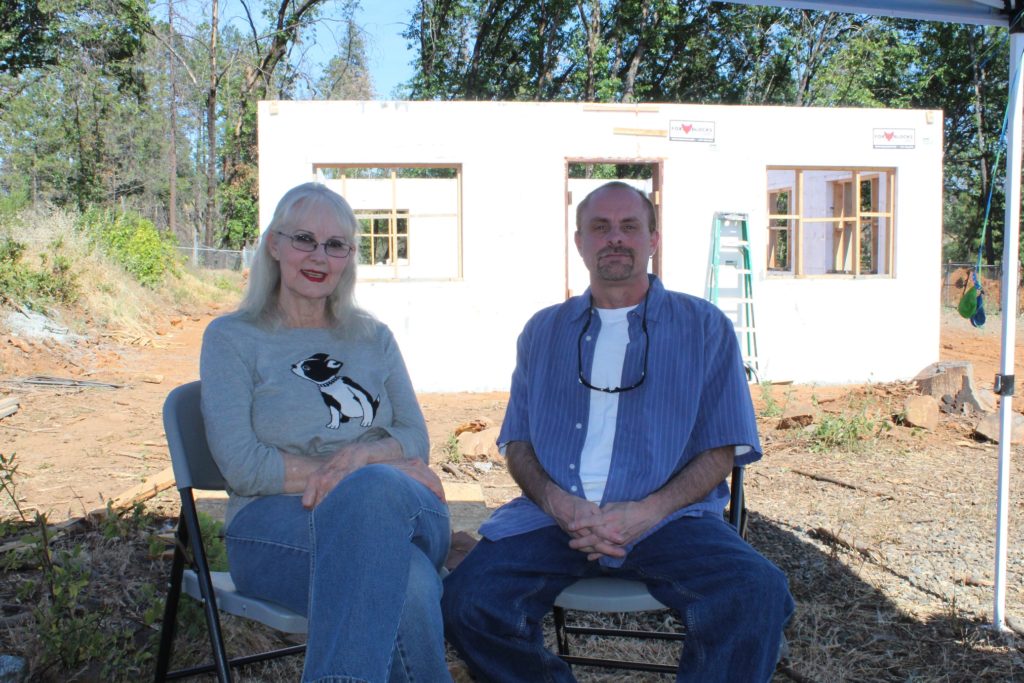
Ownership is why Gary Brand and his mother, Terry Curtis, were so thrilled to be chosen for the program. For them, it means stability—they’ve been lifelong renters who have moved around a lot.
They’ve lived on the Ridge—Paradise and Magalia—the past 20 years. Brand, who is a caretaker for his mother, a deaf senior, said they were looking to buy a home before the fire, “but the prices were just out of control,” and those prices only climbed afterward.
Brand says he wakes up every morning at their rental in Paradise (it survived the fire) and has to remind himself that they’re actually going to be home owners. Like Wolfe and her son, he and Curtis have already envisioned life at their property: sitting on the porch and sipping coffee, working on the yard together and planting roses.
“I’m just so thankful and grateful for everything they’ve done for us,” Brand said.
The families all expressed relief regarding the structure of the homes as well. Habitat for Humanity partnered with the National Ready Mixed Concrete Association to construct these first three homes with insulated concrete forms, designed to make them fire-resistant.
‘An important housing stock’
Habitat for Humanity isn’t the only organization that has been busy with recovery efforts. Come September, CHIP will bring even more families home to Paradise. The organization received 256 applications for the 36 units in Paradise Community Village, a complex that it has been focused on rebuilding since the fire destroyed the original development. First preference will be given to former residents and other Camp Fire survivors.
Similarly to Habitat for Humanity, CHIP’s team was impacted personally by the disaster, with staff from the Ridge who survived but lost everything, said Seana O’Shaughnessy, president and CEO.
The nonprofit has built over 2,600 housing units across Butte, Glenn, Tehama, Shasta, Sutter, Yuba and Colusa counties since it was founded in the 1970s. CHIP serves the same demographic as Habitat for Humanity—low income families that make less than 80 percent of the area median income—and provides mutual self-help (i.e., sweat equity) housing and affordable multifamily apartment housing.
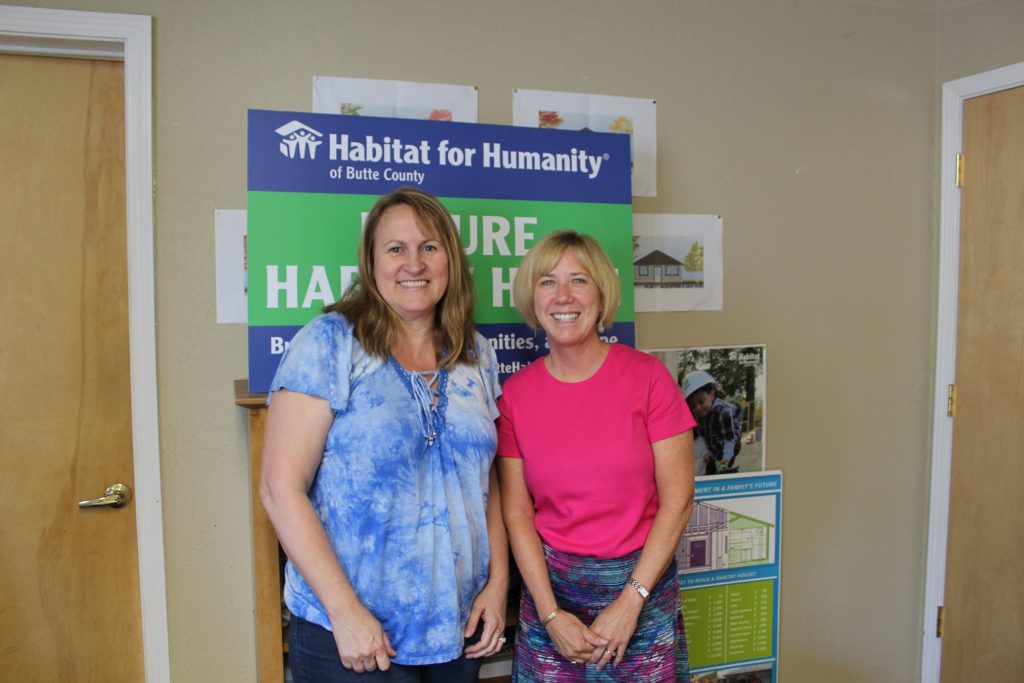
Typically, the organization’s mutual self-help program has neighbors build their homes collectively in a subdivision funded through U.S. Department of Agriculture programs for rural communities. Paradise did not qualify as a rural community until 2019, after successful lobbying efforts.
This removed a significant barrier, O’Shaughnessy said, allowing CHIP to pivot and focus on developing smaller, scattered sites in Paradise to help survivors. The organization is working with four landowners to help them rebuild, and another four families will be purchasing land from CHIP and partnering to build on their new properties.
Both programs have the same purpose of “providing support and helping them through the building process,” O’Shaughnessy said, with CHIP coordinating trade work—such as concrete, electrical and plumbing—so that “they’re able to successfully build their homes.”
CHIP is continuing to focus its efforts regionally: It has about 100 homes in progress across Williams, Corning, Anderson and Biggs (where five homes will be reserved specifically for Camp Fire survivors). In addition to Paradise Community Village, CHIP is pursuing land and funding for another multifamily project in Paradise, O’Shaughnessy added. It is also launching a single-family rental pilot program. CHIP has purchased two lots and two manufactured housing units that will be installed permanently, onto foundations, early next year.
“We know that single-family rentals are something that don’t come back after a fire and other disasters, too,” she said. “It’s not economically feasible for small landlords to rebuild and rent, so we know it’s an important housing stock.”
‘Winning the lottery’
Challenges to building in Paradise have made progress slow-moving, Bateman and O’Shaughnessy both shared. It took Habitat for Humanity months just to get lots ready to go, having to repair/replace septic systems, remove dead and dying trees, and complete lot surveys and leveling.
The pandemic has had its impacts as well. Habitat for Humanity has had to spend more money for construction because it hasn’t been able to rely upon any volunteers.
CHIP has experienced similar barriers, with escalating material costs, labor shortages and subcontractors that are very busy due to all the rebuild activity on the Ridge.
“It’s hard because housing development is so slow. It’s sad that we’re three years out [from the Camp Fire]—we’d like it to be faster, but we are working hard to create that new affordable housing,” O’Shaughnessy said. “It’s important. We need everyone. It’s CHIP, it’s Habitat, it’s organizations coming in—all of us have to work together to meet this tremendous need in our community.”
Those efforts, despite the challenges, have allowed some low-income families with deep roots in Paradise to be able to come home.
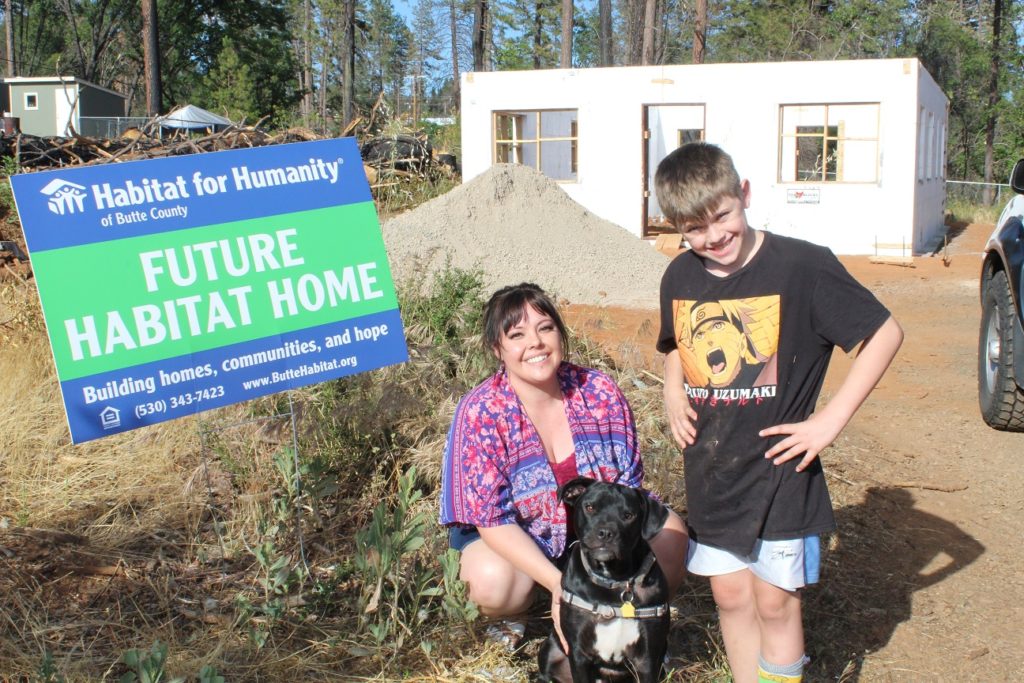
Like the Wolfes, Dayna Collett and her 10-year-old son, Tristan White, found it challenging to find a place to land after the fire—any lead they found was “taken up so fast,” she said. Collett, who was born and raised in Paradise, was living with family at the time of the fire and was not insured.
White has suffered from night terrors and separation anxiety—he had to flee the fire with a family member while Collett was working in Chico, she said. He was on his way to school with cupcakes to celebrate his birthday.
On a recent afternoon while visiting their new property in Paradise, White played fetch with their new puppy, Walter. His dog is a survivor, too, a rescue from 2020’s North Complex Fire. Having Walter as a companion has been therapeutic for her son, Collett shared. The pandemic has exacerbated the trauma he has experienced being disconnected from his community—as his classmates went back to school, he had to continue learning from home. He is an insulin-dependent diabetic, which puts him at greater risk of infection.
Her son has been so excited about coming back to Paradise, Collett shared. White has talked about returning to school, going fishing at the Aquatic Pond and playing at Bille Park. He’s thrilled that his friend Riley, Wolfe’s son, will be one of his new neighbors.
Like Wolfe, when Collett speaks about her future, it brings tears of joy to her eyes. The day she found out she’d been selected for the program is one that she’ll never forget, she said. She heard a knock at the door of her apartment in Chico and opened it to find the Habitat for Humanity team standing there with a sign informing her that she would be a new homeowner.
Her son joined her to see what was going on, and they cried together.
“It was literally like winning the lottery. Like, Oh my god, that just changed my life forever,” she said.
White and she have a Pinterest board that contains images representing their goals and dreams for their new home. Collett said she’s looking forward to enjoying fresh fruits and veggies from her own garden again. Her son is excited about having barbecues and bouncing on a trampoline in the backyard.
“We’re just a family trying to start over. We’re just so grateful for this opportunity and just excited to see where life goes from here.”
Wolfe and Collett both told the CN&R how deeply connected they feel to Paradise. Though the devastation can be hard to bear at times, they haven’t lost hope for the future of the town. They want to be part of its rebirth.
“I hope we can be that beacon of hope,” Wolfe said, “to help guide other people home.”
Go build:
Habitat for Humanity of Butte County is seeking community volunteers to help Camp Fire survivors build their new homes. Go to buttehabitat.org to find out more.

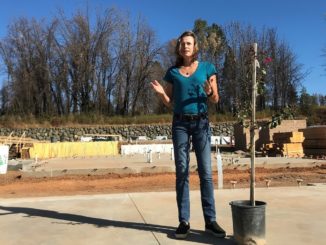
Be the first to comment